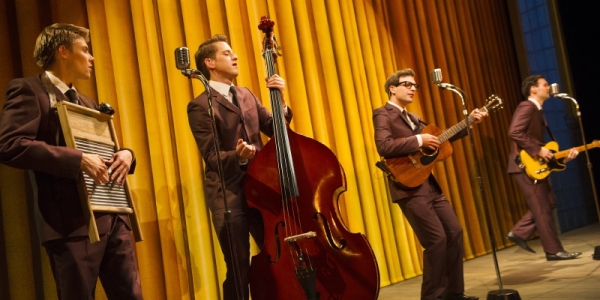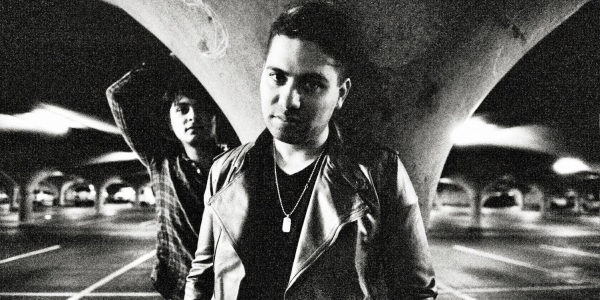“The lead actor Owain Arthur plays Francis, and he’s the driving force behind the play,” Hart tells me. “His energy is really consistent and incredible night after night, and he keeps the whole thing together. In the band, we have a ritual that we call a ‘skiffle-on’ – every night before we go on, we stand around in a circle and shout ‘skiffle-on!’ to get our energy up.” Skiffle is an energetic mixture of styles including jazz, folk and bluegrass, and The Craze throw themselves into it wholeheartedly, performing with manic energy and enthusiasm. They introduce the show, and keep the audience entertained during the various transitions between scenes.
“There’s a lot of engagement between us and the audience,” Hart says. “It’s great fun, and it’s very physical – I play the double bass, so I have to be energetic, as I’m slapping it four times in every bar.”
Hart comes from a classical music background, so adapting to the freewheeling skiffle style has been a challenge. “Don’t tell anyone this, but I’m not really a double bass player!” he says with a laugh. “I’m actually a tuba player and a pianist, and then, I don’t know, maybe a singer. I’ve played bass guitar, but double bass is quite new to me. I’ve played it in shows before, but the slap bass style of skiffle is very new to me.” When he was hired for One Man, Two Guvnors, Hart had about two weeks to get his head around the music – he was thrown in at the deep end, but survived.
“I’ve been doing jazz and pop stuff since my teens, and skiffle is really just a precursor to that kind of stuff,” he says. “The main thing to get my head around was being able to slap it twice and then pull up after the second slap on the strings. Once you’ve done it enough, it stays with you.”
Performing with The Craze also represents an acting challenge for Hart, as the band are required to interact with the audience and cast at various times throughout the performance. “I’ve certainly never done anything like it before,” he says. Without giving too much away, there are moments when One Man, Two Guvnors breaks the fourth wall – audience members are drawn into the insanity on stage, and it’s in these moments that the band must truly be on their game.
“When people are looking for reassurance that stuff is real or not real in the show, they’ll look at the band, and if we’re not right into it, if we’re not engaged, they’ll know,” Hart says.
“We can’t stand there with our arms folded, looking bored – we’ll give it all away. We have to buy into everything that’s happening, whether it’s written or improvised.”
When things go wrong, Hart and his band mates must use their musical skills to cover. “In our second preview in Sydney, something went wrong with one of the curtains and they wouldn’t work at all,” he tells me. “Our company manager came out and apologised, then looked over to us and asked if we wanted to play something. I looked across at the guys and we knew we had to do something. We had a couple of extra songs in our back pocket, so we went on stage and played those. Our sound guy was really on it, and he turned up our mics straight away, so people could hear our discussion! I think people thought it was pretend, that it was part of the show, but when it got to about 10 minutes in, I think people realised that it was a bit too long for that!”
Funnily enough, playing as part of a fictional skiffle band in a stage farce has taught Hart and his band mates a lot about their skills as real musicians.
“It’s been a tremendous learning experience,” he says. “My band-mate Phil Murray Warson plays the piano accordion and the harmonica in the show, but he hadn’t played either of those before. I could play the piano, but not a huge amount, and I know Billy Stooker, our drummer, had never played washboard or spoons before, as he’s required to do here. We had to work to get into the skiffle genre. It died out around 1958 – there are still bands around who play it, but it’s not a common genre anymore. I guess that’s a big part of its appeal, though, is that it’s so accessible you can hear it and immediately connect with it.”
BY ALASDAIR DUNCAN

